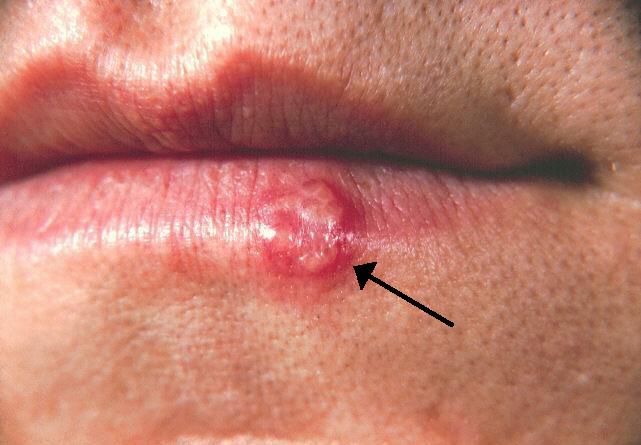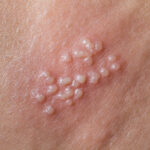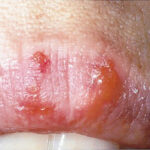Recurrent herpes simplex labialis (HSL) is the reactivation of herpes simplex virus type 1 (HSV-1) manifesting predominantly as vesicular lesions on the lips and perioral skin. Following initial infection, HSV-1 establishes lifelong latency in the trigeminal ganglia, reemerging periodically under specific conditions to cause symptomatic outbreaks, commonly referred to as cold sores.

Causes and Reactivation Triggers of Recurrent Cold Sores
HSV-1 remains dormant within the sensory neurons until reactivated by various factors:
- Emotional or physical stress
- Exposure to ultraviolet (UV) radiation
- Febrile illnesses
- Trauma to the affected area
- Immunosuppression
- Menstrual cycle changes
Understanding individual-specific triggers can aid in minimizing recurrence frequency.
Pathophysiology of Recurrent HSV-1 Infection
The pathogenesis of recurrent HSL involves the following stages:
During reactivation, HSV-1 replicates at the epithelial surface, leading to the characteristic vesicular lesions, often preceded by prodromal symptoms.
Clinical Presentation of Recurrent Herpes Simplex Labialis
Recurrent HSL typically follows a predictable clinical course:
- Prodrome: Tingling, itching, or burning sensation around the lips (6–48 hours before lesions)
- Eruption: Clusters of small, fluid-filled vesicles develop rapidly
- Ulceration: Vesicles rupture and form painful ulcers
- Crusting and Healing: Lesions dry, scab, and heal without scarring over 7–10 days
Lesions are often less severe and shorter in duration compared to primary infections.
Diagnostic Approach for Recurrent Cold Sores
The diagnosis of recurrent herpes simplex labialis is primarily clinical, based on lesion morphology and history of recurrences. Laboratory confirmation may be necessary in atypical cases:
- Polymerase Chain Reaction (PCR): Gold standard for detecting HSV DNA with high sensitivity.
- Direct Fluorescent Antibody (DFA) Test: Rapid identification of HSV antigens.
- Viral Culture: Less sensitive for recurrent lesions but useful for typing.
Serological testing is not routinely indicated for recurrent cases but may assist in unclear diagnoses.
Effective Management of Recurrent Herpes Simplex Labialis
Episodic Therapy
Initiated at the earliest sign of prodromal symptoms, episodic antiviral therapy can abbreviate lesion duration and symptom severity:
- Acyclovir 400 mg orally five times daily for 5 days
- Valacyclovir 2 g orally twice in one day
- Famciclovir 1500 mg orally once
Topical agents, such as acyclovir or penciclovir creams, may reduce lesion healing time when applied promptly.
Suppressive Therapy
For patients with frequent or severe recurrences, daily suppressive antiviral therapy is recommended:
- Acyclovir 400 mg orally twice daily
- Valacyclovir 500 mg to 1 g orally once daily
- Famciclovir 250 mg orally twice daily
Suppressive therapy significantly decreases recurrence rates and improves patient quality of life.
Prevention Strategies for Recurrent Cold Sores
Preventive measures aim to minimize trigger exposure and enhance host resistance:
- Sunscreen Use: Lip balms with high SPF can reduce UV-induced reactivation.
- Stress Reduction Techniques: Mindfulness, meditation, and counseling can mitigate stress-related outbreaks.
- Immune System Support: Balanced diet, regular exercise, and sufficient sleep bolster immune defense.
- Avoidance of Trauma: Protection against mechanical injury to the lips and perioral region.
Patients experiencing frequent outbreaks during specific seasons or circumstances should proactively initiate preventive therapy under medical guidance.
Complications Associated with Recurrent Herpes Simplex Labialis
Although recurrent HSL is often self-limiting, complications can arise:
- Secondary Bacterial Infection: Impetiginization of lesions may require antibiotic therapy.
- Eczema Herpeticum: Disseminated infection in individuals with underlying skin disorders.
- Psychological Distress: Recurrent visible lesions can impact social interactions and self-esteem.
- Ocular Herpes: Autoinoculation can lead to serious eye infections such as herpetic keratitis.
Prompt recognition and management of complications are critical to preventing adverse outcomes.
Emerging Therapies and Future Perspectives
Research into vaccine development, novel antivirals targeting latent virus reservoirs, and immune modulation therapies holds promise for more effective long-term management of HSV-1 infections. Current clinical trials are exploring mRNA vaccine technologies, similar to those used for COVID-19, for herpes simplex virus prevention.
Recurrent herpes simplex labialis remains a prevalent and distressing condition. However, with early intervention, appropriate antiviral therapy, and proactive preventive strategies, we can achieve excellent control over outbreaks, minimize patient distress, and reduce the risk of complications. Future advancements in therapeutic and preventive measures are poised to further enhance management and possibly alter the course of HSV-1 infection.

